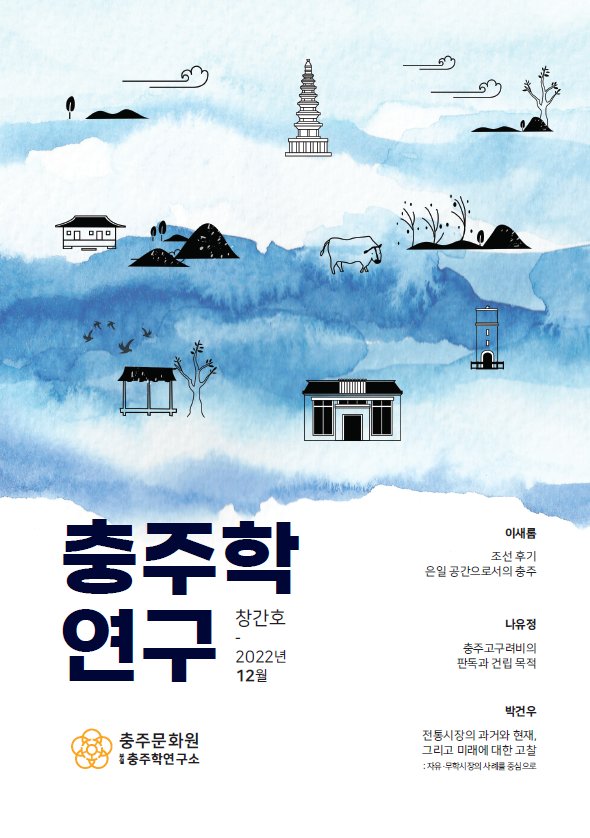조선 후기 은일 공간으로서의 충주
Chungju as a Space of Hiding from the World(隱逸) in the Late Joseon
- 충주문화원 부설 충주학연구소
- 충주학연구
- 창간호 제1권
-
2022.1210 - 51 (42 pages)
- 0

본 연구는 조선 후기 문인들의 한시에 표상된 충주(忠州)의 이미지를 정리하여 충주가 정치적 좌절을 겪은 문인들의 미련과 좌절, 기대 등의 심리가 문학적으로 투영된 공간으로서 정치적·문화적으로 중요한 의미를 지녔음을 밝히고자 하였다. 충주는 예로부터 한양에 접근하기가 쉬웠으며, 풍부한 물산을 자랑하고, 산과 강이 어우러진 승경과 함께 탄금대와 같은 명승지를 완상할 수 있었다. 이러한 지리적인 특징으로 인해 많은 문인들이 충주를 은거지로 삼았다. 특히 기묘명현의 많은 이들이 충주에 은거하며 자신들만의 세력을 구축하였다. 조선 후기에 노론(老論) 핵심 인사들이 호서 지역에 머물게 되면서 충주는 기호사림(畿湖士林)의 학맥을 잇는 공간으로 자리 잡았다. 누암서원의 존재는 충주가 기호사림의 중심지였음을 알려준다. 조선 시대 문인들은 정치적 혼란기에 일시적으로 혹은 오랜 기간 중앙정계에 설 자리를 잃었을 때, 그들 나름대로 영향력을 행사할 만한 공간으로 충주를 택하였다. 조선 후기 문인들 중 많은 이들이 충주에 내려왔지만 대부분 충주에 은거하는 기간은 짧은 편이었다. 대부분 출사와 은거를 반복하였기 때문이다. 그중 정호(鄭澔)와 안중관(安重觀)은 노론 문인으로 충주가 고향이며, 정치적으로 불리할 때마다 충주에 은거하였다. 두 문인은 충주에 거주하며 많은 시를 남겼는데, 충주에서 누리는 아름다운 풍경과 한적함에 대한 만족감을 표출하는 한편, 자신의 뜻을 알아주지 못하는 현실에 대한 염증, 출사에 대한 미련을 표출하였다. 정호는 영의정 ‧ 좌의정을 역임할 정도로 중앙 관료로서 활약하였으며, 당시 노소(老少) 갈등의 중심에 있던 인물이었다. 정호는 은거를 자신의 뜻을 관철시키기 위한 의사표시의 수단으로 활용하였다. 그렇기에 언제든지 도성으로 돌아갈 수 있는 충주를 은거지로 택하였다. 안중관은 주로 외직에 있었으며, 그가 스스로 사직한 이유가 뚜렷하게 드러나지 않는다. 다만 그가 은거하며 쓴 시에는 그의 불우의식과 현실에 대한 염증이 짙게 드러난다. 안중관은 현실에 대한 체념으로 인해 은거를 택하였지만 도성을 향한 미련으로 인해 최후의 배수진으로서 도성과 가까운 충주에 머물렀던 것으로 보인다. 충주는 조선 후기 문인들에게 복잡한 현실 속에서 잠시 떨어져 여유로움과 위안을 얻어갈 수 있는 곳이자 언제든 출사의 기회를 놓치지 않을 만한 공간이었음을 확인하였다.
This study summarized the image of Chungju (忠州) represented in the literati’s classical Chinese poetry in the late Joseon, and confirmed that Chungju had important political and cultural significance as a literary space in which the psychology of regret, frustration, and expectations of the literati who had suffered political setbacks was projected. Since ancient times it was easy to access Seoul from Chungju, and it was possible to appreciate famous sights such as Tangeumdae along with the scenery of the mountains and rivers. It was also an area where products were abundant. Due to these geographical features, many of the literati stayed in Chungju. In particular, many figures of victims of Kimyo Year Literati Purge secluded in Chungju and established their own influence. In the late Joseon, as key Noron figures stayed in the Hoseo region, Chungju also established itself as a space connecting Kiho Sarim’s academic vessel. The existence of Nuam‐seowon indicates that Chungju was the center of Kiho Sarim. The literati in the Joseon era lost their place in central politics temporarily or for a long period of time during the political turmoil, but they chose Chungju as a space where they could exert their own influence. Many of the literati in the late Joseon came to Chungju, but there was a tendency that most of them were secluded in Chungju for a short period of time. Most of these repeated going to office and being secluded. Among the literati in the late Joseon, Jeongho(鄭澔) and Ahn Jung‐gwan (安重觀) were the Noron literati, and were secluded into Chungju as their hometown whenever they were politically disadvantaged. The two literati lived in Chungju and left many poems, and while expressing satisfaction with the beautiful scenery and serenity enjoyed in Chungju, they expressed their disgust about the reality of not being able to understand their intentions, and their lingering about going to office. Jeongho was active as a central bureaucrat to the extent that he served as Yeonguijeong‐Jwauijeong, and he was at the center of the noron‐soron conflict at the time. Jeongho’s seclusion was utilized as a means of expressing his will to carry out his own will. Thus, that’s why he chose to be secluded in Chungju, where he could return to Seoul at any time. Ahn Jung‐gwan was mainly employed at a government post away from the capital, and it is not clear why he resigned himself. However, his poems that he wrote while he was secluded deeply reveal his awareness of misfortune and his disgust of reality. Although Ahn Jung‐gwan chose to be secluded because of his resignation from reality, he seems to have stayed in Chungju, close to Seoul, as a position taken up with a river behind the troops because of his lingering toward Seoul. It was confirmed that Chungju was a place where the literati in the late Joseon could get relaxation and solace from the complex reality for a while, and a space where they could not miss an opportunity to go to office at any time. Through this, the literati’s awareness and literary discourse in the late Joseon was investigated in a space outside of Seoul, a symbol of central power.
Ⅰ. 머리말
Ⅱ. 인문지리적 시선으로 본 충주
Ⅲ. 충주의 학적·인적 네트워크
Ⅳ. 충주 은거 양상과 시적 형상화
Ⅴ. 맺음말
(0)
(0)